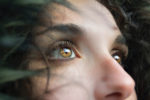Contact lenses are made of plastic, or more recently of silicone hydrogel, and are hypoallergenic. Only an external agent can make us allergic.
For many of us, spring and early summer is the most beautiful season. Nature shines in lush green. Everything that can, blooms to full strength and immerses the world in magical colors and fragrances. And when the weather’s right, the sun shines, it’s warm and you want to get outside.
But more and more people find it difficult to go out during this period. The number of people suffering from pollen allergies and hay fever is rising in Switzerland. The eyes are the worst affected, as they itch and burn, and are much more sensitive to light than usual.
You can minimize your suffering, thanks to good preparation and a few precautions on a daily basis, especially during this period of high pollen density in the air.
Did you know that there’s a smartphone application or glasses with intelligent anti-light lenses?
The latest generation of photochromic lenses helps eyes to manage light at all times and provides optimum protection.
We’ve got some useful tips for eye care, even if you’re not prone to hay fever, because they’re not just good for pollen-soaked eyes.
Grasses, hazelnuts and other grasses bloom again and distribute their pollen in the form of fine dust throughout the air. Mild winters and early springs with little rain also favour the concentration of the poles. But why is it that the eyes in particular react so sensitively to them? On the way to the nose, the eye has no mucous membrane to protect it from dust particles and pollen. Flower dust reaches the conjunctiva unfiltered, and can cause mild irritation or even allergic conjunctivitis.
The immune system sounds the alarm. Pollen allergy or hay fever is an over-reaction of the immune system to one or more types of pollen. The immune system misinterprets contact with harmless pollen proteins as an attack. The release of histamine by the immune system, a mediator unique to the body, signals the immune system and triggers the allergic reaction. This is accompanied by dilation of the blood vessels, followed by redness and swelling of the eye. In this state, the eyes swell, itch and burn, and are also particularly sensitive to light.
The number of allergy sufferers in Switzerland is on the rise. Studies have shown that the number of people suffering from pollen allergies in Switzerland has doubled over the last 30 years. This trend is attributed, among other things, to the plants and trees in our cities, which produce aggressive pollen in response to climate change and air pollution.
Prevention is the best protection. While it is unfortunately difficult to avoid all contact with pollen, it is at least possible to minimize it and, in the best case scenario, to keep your own home or at least bedroom free of pollen. First and foremost, you need to know what type of pollen you’re allergic to, so you can protect yourself effectively.
For example, like this:
- During the flowering phase, when pollen levels in the air are high, simply air your apartment early in the morning and in the evening. Keep windows closed during the day. Caution: pollen flies everywhere and all the time in strong winds.
- Change your clothes regularly, especially when you get home. Take a shower and wash your hair before going to bed, and don’t hang up your clothes in the bedroom.
- Change your sheets more often than usual, vacuum every day and don’t dry your laundry outside.
- Avoid intense physical activity outdoors, and play sports indoors, especially lawn mowing and gardening.
- Keep windows closed when driving.
- Wear glasses instead of contact lenses. Well-fitting sunglasses also protect the eyes from pollen, and the irritated, hypersensitive mucous membranes of the eyes from too much light.
- If you’re lucky enough to be able to go away during these difficult periods, opt for the mountains above 2,000 meters, the sea or the desert. The air in these places is almost pollen-free.
Check the percentage of pollen in the air via Smartphone. Those in contact with pollen can obtain information via their smartphone thanks to the “Pollen News” app. It provides pollen forecasts and important tips for coping with pollen allergies.
Just ask us! It’s part of our remit to give advice about eyes and vision. We’re also the first point of contact when it comes to red eyes or eye irritation caused by allergies. By the way, an eye bath brings immediate relief.





